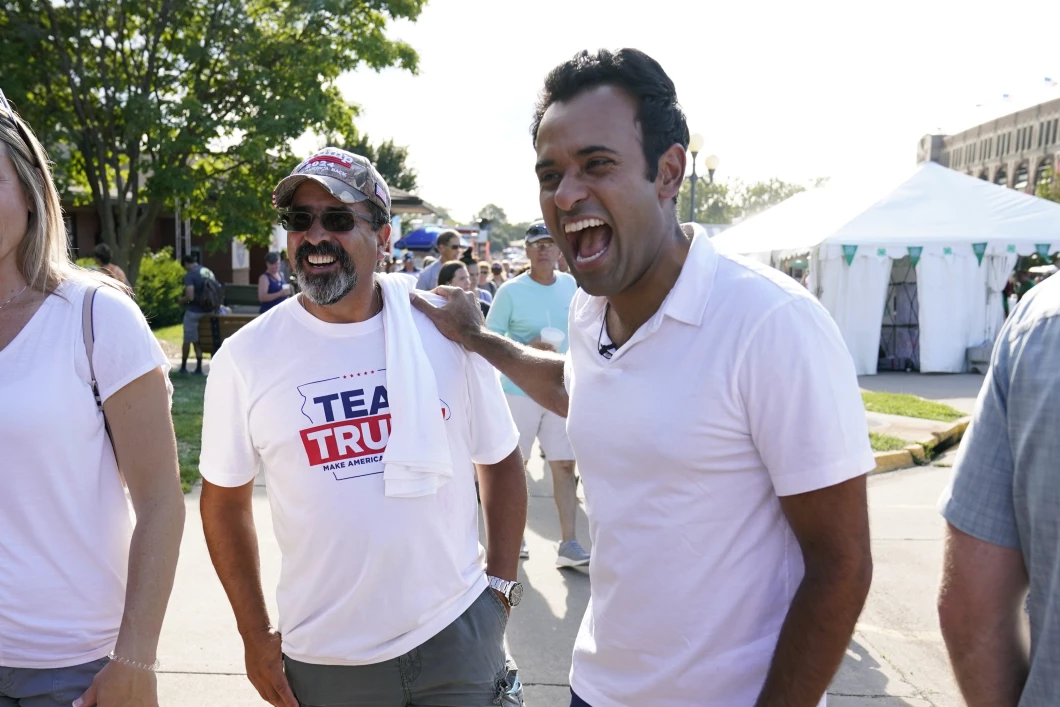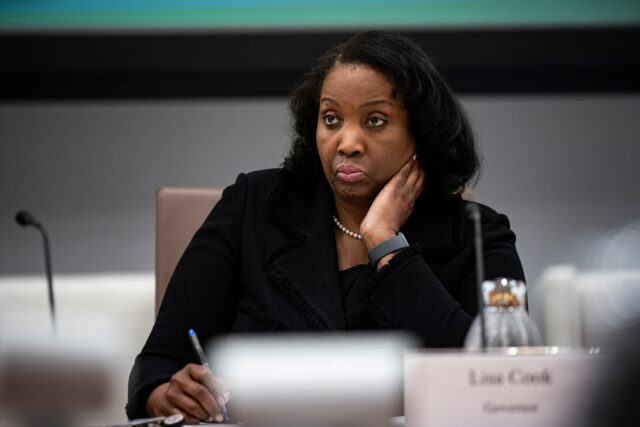by Julia Johnson, Politics Reporter. Media: Washingtonexaminer
Biotech entrepreneur Vivek Ramaswamy went from completely unknown to the third, and second, in some cases, most preferred candidate in polls of the 2024 Republican primary race over the course of months. He's managed to rise above several established politicians in the polls, who already benefit from preexisting name identification, namely Sen. Tim Scott (R-SC), former U.N. Ambassador Nikki Haley, and former Vice President Mike Pence. According to a campaign source, part of why Ramaswamy has seen this kind of success is his understanding of the changing media environment and how it is perceived by Republicans across the country. Ramaswamy's campaign has spent very little on paid media, opting to spend more money on travel and events with primary voters, and has invested in roughly 190 events since its launch in late February. "Paid media doesn't build trust," the source explained. "He's been an extremely energetic campaigner in Iowa and New Hampshire and South Carolina and Nevada and just shows up a lot more than others do," University of Denver Center on American Politics Director Seth Masket said. Ramaswamy's campaign is keeping the fact that Republican voters are skeptical in mind as it looks to rally supporters. The campaign believes the base of the party is particularly wary of plants, referring to politicians who have been groomed for years to ultimately become president and maintain a status quo. These plants might "say the right things" but do "the same thing as the bipartisan establishment has always done" once elected. Columbia University Department of Political Science professor Robert Y. Shapiro explained that Ramaswamy offers an entertainment value and charisma similar to what former President Donald Trump brought to the table in 2016 — and made a hallmark of his presidency. "He has had some resonance in that he is a new, younger face on the scene and has come in from outside politics as a self-made person from the business sector," he noted. Being an Indian American also contrasts him from the rest of the field, as it does for Haley, but Ramaswamy enjoys the benefit of being "an outsider to politics," he said. Ramaswamy is seeing upward movement in the polls because "he offers something different and refreshing. And people who talk to pollsters like different and refreshing," according to Republican strategist John Feehery. "Ramaswamy has some of the same outsider appeal to Republicans that Trump had in 2015 and 2016," political scientist and University of South Carolina professor David Darmofal echoed. "Ramaswamy appeals to Republican voters who are concerned about what they view as entrenched elites in government." Ramaswamy's campaign believes that his straightforward nature, similar to that of Trump, gains him popularity. According to the campaign source, his way of connecting with voters is "just kind of is who he is. And it kind of meets the moment that the Republican Party is in." Republican strategist Alex Bruesewitz said Ramaswamy has been able to bolster himself from being unknown because he "actually has a personality," which he claimed Gov. Ron DeSantis (R-FL) doesn't. But Ramaswamy isn't coming across to everyone as authentic. "I think he's a very good performer. I think he's a very smooth talker," said GOP strategist David Kochel. He also described him as "thought provoking and interesting." "Authentic? Not so much," he added. "Because I just don't think you can go from being much more mainstream to this sort of MAGA that quickly," Kochel explained, referencing some alleged policy stances that Ramaswamy has walked back. [caption id="attachment_8178" align="alignnone" width="1060"] Republican presidential candidate businessman Vivek Ramaswamy talks with Robert Nazario, left, of Iowa Falls, Iowa, at the Iowa State Fair, Friday, Aug. 11, 2023, in Des Moines, Iowa. (AP Photo/Charlie Neibergall)
Republican presidential candidate businessman Vivek Ramaswamy talks with Robert Nazario, left, of Iowa Falls, Iowa, at the Iowa State Fair, Friday, Aug. 11, 2023, in Des Moines, Iowa. (AP Photo/Charlie Neibergall)Charlie Neibergall/AP[/caption] In navigating a primary race against a popular former president who has been indicted in four cases, Ramaswamy has maintained respect for Trump and defended him fiercely against each indictment. The various indictments have not caused Republican support for Trump to drop, and he has instead seen boosts in his polling. Masket noted, "He is someone who is very supportive of Donald Trump and has probably gone the furthest of all the candidates and saying what he would do to defend Donald Trump legally." This is a good strategic choice by Ramaswamy, according to Bruesewitz. He "doesn't call Trump supporters 'listless vessels.' He respects what President Trump accomplished, and he doesn't whine about Trump's record," he said of Ramaswamy's upward mobility. "Ramaswamy has been consistent with most of his messaging and continues to pound the drum on the issues that matter to Republican voters without attacking Trump. That seems to be resonating with GOP voters at a time when DeSantis is looking to regain his footing," GOP strategist Ron Bonjean explained. In several recent polls, Ramaswamy has beaten DeSantis out or tied the Florida governor for second place behind Trump, who boasts a double-digit lead. DeSantis's campaign has maintained that the primary is a two-man race, despite these developments. However, while Ramaswamy's bid has shown signs of promise in these national surveys, his efforts haven't yet translated into a bump in early state polling. For example, in a new Des Moines Register-NBC News-Mediacom Iowa poll, he received just 4% of the vote. This is lower than his 9% nationally. DeSantis, on the other hand, saw 19% in Iowa compared to 16% nationally. "I think he's a total media creation," said Kochel. "He wins all these internet polls, and that's cool, but he's also very much — he kind of comes out of that internet buzz machine, sort of the MAGA world. He reverberates inside that bubble a lot. I don't think he's got any traction in the voter world." "I am more than a bit skeptical that this will translate into actual votes. I remember how Republican voters liked Herman Cain and Ben Carson but didn’t vote for either one. Vivek reminds me of them," Feehery said. Kochel claimed, "The national polls don't really mean very much. What's going to happen in Iowa, New Hampshire, and South Carolina are gonna really dictate what the status of the race is going into Super Tuesday." Social media, something wielded by Trump throughout his presidency, is also an important factor in Ramaswamy's effort. Instagram's reels have been an especially crucial asset for Ramaswamy, even more so during the beginning of his campaign when legacy media outlets were less willing to cover him. Pew Research reports that Trump published over 26,000 posts on X, the platform formerly known as Twitter, during his presidency. Ramaswamy's Instagram account posts two short videos, called reels, to the platform daily, many of which are clips from his various podcast appearances. Ramaswamy also shares posts on X more frequently than other candidates. "Vivek is younger than the other candidates. And you can also see that he's more authentic than any other candidate, other than Trump," Bruesewitz said. "He's significantly more authentic than DeSantis, and it doesn't seem like he has a team of consultants that write his tweets for him. It seems like he does it on his own, like [Trump]." Since Ramaswamy doesn't enjoy the advantage of name identification that many other candidates do, Ramaswamy joins at least four to five podcasts a day. This is because he is willing to speak with people across the spectrum, but it's also due to the necessity of getting himself in front of voters. His frequent podcast appearances demonstrate an early investment in an increasingly fragmented media landscape. Joining the likes of Bill Maher, Russell Brand, Jordan B. Peterson, Bari Weiss, Charlie Kirk, Megyn Kelly, Candace Owens, and Tim Pool, among others, Ramaswamy is able to use the conversational tone to his advantage, something seasoned politicians may not be used to. Ramaswamy even launched his own podcast around the time his campaign began. He is additionally willing to join cable television programs, particularly on Fox News, CNN, MSNBC, and others. But despite now appearing in some polls to provide a challenge to Gov. Ron DeSantis (R-FL), who has consistently been seen as the only credible challenger to Trump, his campaign revealed that it still struggles to ensure that Ramaswamy is included in coverage. "If you're not fully part of that bipartisan establishment where you have those relationships with reporters and you're a known entity, then they're just less likely to cover you," a campaign source said. Ramaswamy's television media presence is similar to that of a 2020 Democratic candidate, who was also a millennial, according to Darmofal. "He's also been doing many TV interviews," he noted. "Effectively following Pete Buttigieg's strategy in this regard in 2019 and 2020." Ramaswamy's increases in polls have forced media, opponents, and voters "to take a harder look" at him, said the campaign source. He gained further credibility as a threat to DeSantis when a memo was released from his super PAC detailing instructions for the Florida Republican to "take a sledgehammer to Vivek Ramaswamy." It also advised that he dub Ramaswamy with a nickname, suggesting "Fake Vivek" or "Vivek the Fake." After it was reported, Ramaswamy responded to DeSantis's apparently revealed debate strategy from Never Back Down. "Another boring, establishment attack from Super PAC-creation 'Robot Ron' who is literally taking lame, pre-programmed attack lines against me for next week’s debate. 'Hammer Ramaswamy,'" he wrote on social media. DeSantis's campaign has largely dismissed the notion of a threat from Ramaswamy. According to press secretary Bryan Griffin, "More money has been spent attacking Ron DeSantis than either the current or former president combined, and we fully expect the candidates at the debate to primarily come after Ron DeSantis because he is the greatest threat to every other Republican primary contender." While there is a super PAC backing Ramaswamy's effort, it exists on a much smaller scale than those of other candidates. The PAC, American Exceptionalism, spent less than $500,000 in the 2024 election cycle in independent expenditures supporting Ramaswamy. Because Ramaswamy isn't encumbered by a super PAC with a large presence and doesn't rely on many high-dollar donors, he can speak freely and isn't beholden to other parties. He also enjoys the benefit of being independently wealthy due to his founding of biotech firm Roivant Sciences in 2014. "He doesn't seem constrained by much," Masket said. "He's willing to make fairly strong and provocative arguments, but also without seeming uninformed — he clearly has some knowledge of policy detail. You can at least back up and defend the things he's saying." "Unlike some candidates who are more concerned about the reputations or trying to play it safe on some issues, he is willing to put himself out there to get noticed, and so far, it seems to be working for him," he explained. Strategists and political scientists expect Ramaswamy to likely have a "moment" during the Republican National Committee debate on Wednesday. They cite his personality and willingness to push the limits with strong opinions and policy proposals for this prediction. The memo from DeSantis's PAC has further served to boost Ramaswamy's profile ahead of the event. With Trump not participating, the debate presents an opportunity for Ramaswamy to reach new voters.


